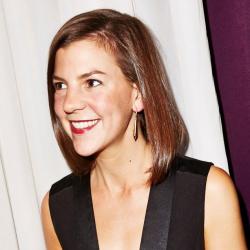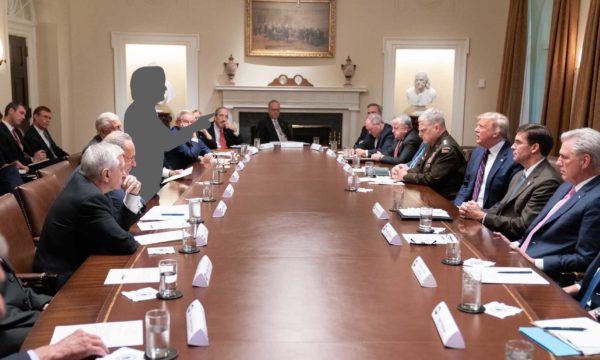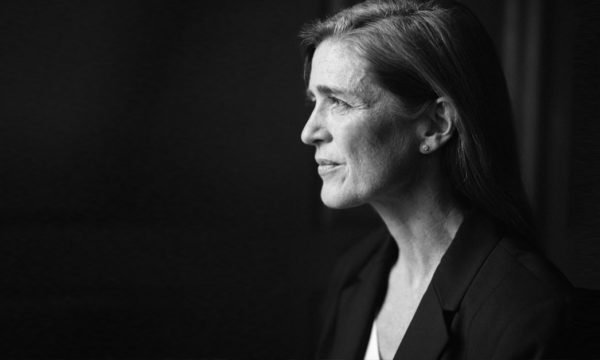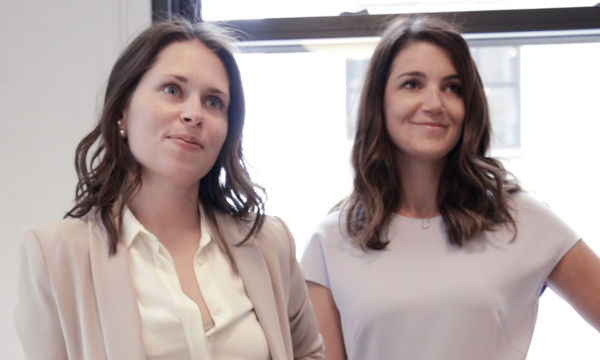
Shop This Look
Meet the Future of Women in Politics
We spoke to five women working with She Should Run, a nonprofit that helps women who are curious about running for office.
In 2011, political veteran Erin Loos Cutraro founded She Should Run, a nonpartisan nonprofit that provides tools and training to women who are curious about running for office. Since then, She Should Run’s programs have reached more than 26,000 women, and over 18,000 women have taken concrete steps toward a political future through She Should Run’s flagship course, the Incubator. As campaign season for the 2020 elections starts to heat up, we spoke to Erin as well as four women who, with She Should Run’s help, are now on a path to their own political careers.

Erin Loos Cutraro, Founder and CEO of She Should Run, Washington, D.C.
It’s a fair question. The answer is, I might see that path for myself in the future, perhaps in a local office, but for right now, I think She Should Run is the lever I can pull that’s going to make the biggest difference.
I was primarily raised by a single mom in St. Louis, Missouri, and I think what shaped my eventual connection to women candidates was seeing women get things done. My mom’s philosophy was, ‘Something’s in our way? Let’s figure out how to break through it or go around it.’ I was naturally attracted to people like that in my professional life, too—people who were impatient with dysfunction.
What ultimately pushed me to start She Should Run was frustration. I’d been working in politics for years, primarily on the front lines with candidates who were trying to prove their viability to the big, institutional players, and I’d seen a lot of women at the table for all the right reasons but without a traditional boy’s club network. As a result, growth in women’s representation wasn’t happening fast enough.
I thought, ‘Okay, how can we accelerate this? I know what we’re doing on a high level, but what about all of those other women at the bottom of the pipeline who are not even thinking about running or who think it’s just not a possibility for them?’ I pictured it like investing—maybe we needed to diversify our portfolio of potential candidates instead of putting all our eggs in a few baskets. From there, we came up with the concept of Ask a Woman to Run, which remains one of our biggest programs, and built the foundation for She Should Run.
As much as I want to tell women who are exploring political office that it’s a level playing field, I know we’re not there yet. But what I can tell them is that they’re not alone, and I think that’s the greatest value of She Should Run: our community. We can say, ‘Those feelings that you’re having about being held to a double standard, and being attacked by people, and how unfair it is—you’re not crazy, and we’re here for you to lean on.’
Want more M Dash?
Sign up for our weekly newsletter.
Thank you!
Ana Clara Blesso, Career Counselor, East Hartford, CT
A few years ago, I started working with the American Association of University Women to host salary negotiation workshops here in Hartford, and that’s what ignited my interest in politics. For the first time, it really hit me just how deep the wage gap is. I saw how much I, identifying as a Latina, will need to work harder and longer to get to the same financial level as someone who identifies as a white heterosexual male. Looking at that reality, and seeing the people it impacted—like the women in that room with me—was really powerful. And that was the moment I realized that sure, it’s great that I’m doing this work with people one-on-one, but I need to get more involved at the policy level.
Jumping into politics is incredibly daunting, which is part of why I joined the She Should Run incubator. I needed real action steps to take me from the idea of ‘maybe someday’ to having an actual plan to impact policy that’s going to make people’s lives better.
I’ve been in Connecticut for about five years now. The more community events that I go to, the more I’ve seen that there isn’t a lot of representation that aligns with my community. I’m a proud, naturalized U.S. citizen who immigrated here from Brazil when I was a child, and I know so many people with experiences like mine. Most people I’ve met in Connecticut government have been here for generations, and while there’s value to that history, I think that having greater immigrant representation would be helpful, given how many immigrants we have in our state.
I think one of the most intimidating things about getting involved in politics is trying to figure out, ‘Where do I get in line? How do I get people to think of me for certain jobs and responsibilities?’ And She Should Run says, ‘You don’t have to wait your turn.’ I’ve realized it’s okay if I’m not someone whose grandparents lived here. I still have value in this state. I’ve also developed a network of people who are cheering for me, and that’s critical. I met some people in the incubator whom I text with regularly now, and when I have doubts or questions, I know they’re going to be there for me in a non-judgmental space.”

Kristen Prewitt, Financial Advisor, Orlando, FL
It’s not about shiny objects; it’s about freedom and personal empowerment. I’m passionate about helping people.
I adopted a little girl about three and a half years ago. I didn’t wait to become a parent until when society might say is “the appropriate time,” which for most women is when they’re partnered. I chose the right time for me. And now that I’m running my business and my life and raising a daughter, I see the world a little differently. I’m aware of my daughter’s lens and what she hears. One thing I’ve noticed is that, in children’s books, when the characters are animals, they’re usually all male—all the bunnies in the book are ‘he’ and ‘him.’ Now, when I’m reading those books to my daughter, I change the pronouns to ‘she’ and ‘her,’ and I can see the difference in the way she responds. It’s a small example, but it really shows how the world is set up for certain genders and types of people more than others and the impact that can have.
Now that I’m a parent, She Should Run seemed like the right next step for me to educate myself about how to have a bigger voice in my community. I believe that we should all do our part to affect justice in a way that aligns with our skill set and our voice. I also think that having more women and minorities in positions of leadership and influence is the only way that we are going to start enacting policies that serve everyone in our country.
Huge dreams can seem so far away. But I learned during the process of adopting my daughter (which was a long journey) that you reach big goals because you take one step, and then the next step, and then the next step. By the time you get to the end, you’re like, ‘Oh, okay. It makes sense that I’m here now.’ I’m not running for anything yet, but I want to do the next thing to put myself in a position so that when the time seems logical, I feel confident taking that risk and running for office or doing something in the public space.”

Audra D. Luke, Author, lawyer, entrepreneur, and youth advocate, Atlanta, GA
The girls I worked with were so angry, and they didn’t know how to release it—so I taught them to use poetry as a tool.
My own backstory is that I was sexually molested by a neighbor’s grandson as a child, and my life was threatened if I ever told anyone. My voice was taken away because I was afraid to talk about what happened to me, so I started writing poetry, and that’s what saved me.
Of course, trying to teach poetry to a group of angry teens wasn’t easy. A lot of the students would say, ‘Nobody cares about poetry, and you must be stupid. You went to law school, and you could be rich right now. Why are you in this prison teaching poetry when you could be out driving a Mercedes?’ And I told them, ‘Sometimes, if you know that you are put on this earth to do something, you have to do it. It’s not a matter of money or what other people think. It’s a matter of staying true to yourself.’
But I still couldn’t convince the girls to take poetry seriously. So finally, I realized that if I could get on TV with my poetry, then maybe that would change their minds. After a lot of effort and persistence, I managed to get an audition at the Apollo, a historical theater in New York, and then I ultimately won their performance contest. After that, celebrities invited me to work with them—Russell Simmons, Patti LaBelle, Sinbad. And once I was on television and recognized by celebrities, the teens started listening to what I had to say. It helped them understand the concept of poetry as a force of empowerment and understand the power of communication.
In addition to being a spoken word artist and a teacher, I now run my own nonprofit, GreenGelo, which uses video to help teen girls communicate. And more recently, I have become involved with She Should Run. I’m interested in finding new ways to remain a servant and an effective leader. I recently had the honor of being appointed to the board for the Department of Family & Children’s Services in Georgia. I’m so excited to have my foot in the door! I may not know exactly which political position I’m going for yet, but I do know that I’m on the right path.”

Shannon DeVaughn, Talent recruiter at a law firm, San Francisco, CA
I was driving down the highway, and I saw a billboard for an organization called CASA, which stands for Court Appointed State Advocate. I’m Christian, and something about that sign on that particular day felt like a message—I can’t quite explain it. So I went home and Googled it, and that’s how I became a volunteer Court Appointed State Advocate for children who are separated from their parents because of neglect or abuse.
Becoming involved with CASA revived my passion for the law. When I was a child, I wanted to become an attorney, but when I was a teenager, I started worrying that I wasn’t smart enough. Looking back, I know it was imposter syndrome, but at the time, I just felt very inadequate when I compared myself to the white kids at my school whose parents owned golf courses. With CASA, I got to see that there are many black female judges in Dallas County, and they’re stars for me to look to. I’m currently preparing for the LSAT to apply to law school.
I’m 31, so I know that I’m young, and I’m not in a rush to run for office. It’ll take a lot of courage when the time comes and a lot of funds that I don’t currently have. But I think it’s important to start thinking about it. And in the meantime, it’s important to stay informed. There was a point in time when my grandparents did not have the full right to vote; I remember my grandma telling me about poll taxes. That was not so long ago. It’s a privilege to be part of the democratic system, on any level, and I don’t take it lightly.”








